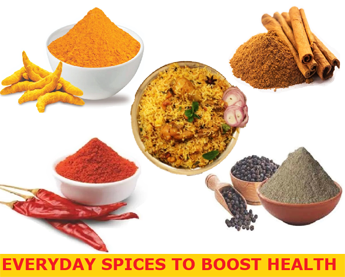Health Benefits of Spices: Boost Flavor and Wellness Naturally
Spicing up a plain-but-healthy meal is not only good for your taste buds but also for your overall health! By reaching for your spice rack, you can enhance the flavor of your food while getting a natural boost of antioxidants – powerful substances that help protect your cells from damage and reduce the risk of chronic diseases.

Why Spices Are a Superfood for Your Kitchen
Nutrition researchers have identified more than 100 common spices used in cooking worldwide, and many of them are concentrated sources of antioxidants. These antioxidants in spices, such as curcumin in turmeric or allicin in garlic, help reduce oxidative stress, support heart health, and even improve digestion.
There is no need to search for exotic or hard-to-find ingredients. Everyday spices from your local market, like black pepper, cumin, cinnamon, turmeric, and ginger, pack powerful health benefits and can be easily added to your regular meals.
Bioactive Compounds and Their Benefits
Several studies suggest that the bioactive compounds in spices – such as capsaicin (found in chili peppers), eugenol (cloves), thymol (thyme), cinnamaldehyde (cinnamon), and gingerol (ginger) — can:
-
✅ Lower LDL or “bad” cholesterol
-
✅ Reduce triglycerides
-
✅ Improve inflammation markers
-
✅ Aid digestion
-
✅ Support metabolism and weight management
These natural compounds are why incorporating spices into your daily meals can be a simple yet effective way to improve long-term health.
Fresh vs. Dried Spices: Which is Better?
Whether you use fresh or dried spices, you will still benefit from their healthy compounds. However, cooking methods can make a difference.
Frying or grilling may reduce the antioxidant levels of spices, while methods like microwaving, simmering, or stewing can actually increase their antioxidant activity.
Supplements vs. Natural Spices
Many studies on the health benefits of spices use supplements to provide higher doses of active compounds than you had typically consume in food. However, commercial supplements aren’t strictly regulated, meaning the dosage and purity can vary.
If anyone considering taking a spice supplement, such as curcumin capsules or garlic tablets, consult your doctor or dietitian to determine the right form and dosage for your needs.
Smart Ways to Add Spices to Your Diet
If you want to boost your spice intake without compromising health, try these tips:
-
Use chili peppers in healthy recipes like turkey chili, lentil pilaf, or vegetable stir-fry.
-
Sprinkle cinnamon on oatmeal or smoothies for a blood-sugar-friendly breakfast.
-
Add turmeric and black pepper to soups or stews for a natural anti-inflammatory boost.
Just remember, for some individuals, spicy foods can trigger acid reflux or heartburn, so adjust the amount to suit your tolerance.
In Summary
Adding spices to your meals is simple, affordable, and healthy. They make food taste better and add antioxidants that protect your body. Spices also help your heart, digestion, and overall health.
Enjoying your meals is important for long-term healthy habits. So, try different spices to add variety and nutrition to your diet.
Always talk to your doctor before making big diet changes or taking supplements. Medical Disclaimer.
Read further on:
≺≺ How important is fiber in the diet?
≺≺ What cardiovascular benefits do berries provide?
≺≺ What Is the Ketogenic Diet? Is the Keto Diet Right for Everyone?
≺≺ What is the Okinawan diet? What is the secret behind Okinawan long life expectancy?
≺≺ Ultra-Processed Foods: What They Are, Why They’re Harmful, and How to Cut Back.
≺≺ What eating strategies work best for losing weight long term?
≺≺ How Do Sugary Meals and Beverages Harm Dental Health?
≺≺ Why Vitamin B12 Is Important for Your Health?
≺≺ What type of exercise is best for lowering my blood sugar?
≺≺ What foods should people with high blood pressure avoid?
≺≺ What foods and vitamins are good for your skin?
≺≺ What are the top three minerals you can take to boost memory?
≺≺ Why is regular table salt considered unhealthy?
≺≺ What makes Himalayan salt different from regular table salt?
≺≺ What is wrong with ONE-A-DAY Vitamins?
≺≺ What health problems are linked to consuming corn syrup?
≺≺ What food is most effective for moderating blood sugar?
≺≺ EWG’s- The Clean Fifteen: Fruits and Vegetables with the Lowest Pesticide Levels.
≺≺ What are antioxidants? How antioxidants in the fruits and vegetables help in preventing cancers and diseases?
≺≺ How can I reduce the risk of cancer-causing chemicals when cooking or grilling meat?
≺≺ What happens to my blood vessels when I gain weight?
≻≻ Watch this page for more such informative articles on Health, Nutrition, and Wellness.
≻≻-Back to Home page.
Further reading (External Links opens in new window):
≺≺- Johns Hopkins Medicine – 5 Spices with Healthy Benefits.
≺≺- Harvard Health Publishing – Spicy foods associated with longer life, Harvard researchers find.

